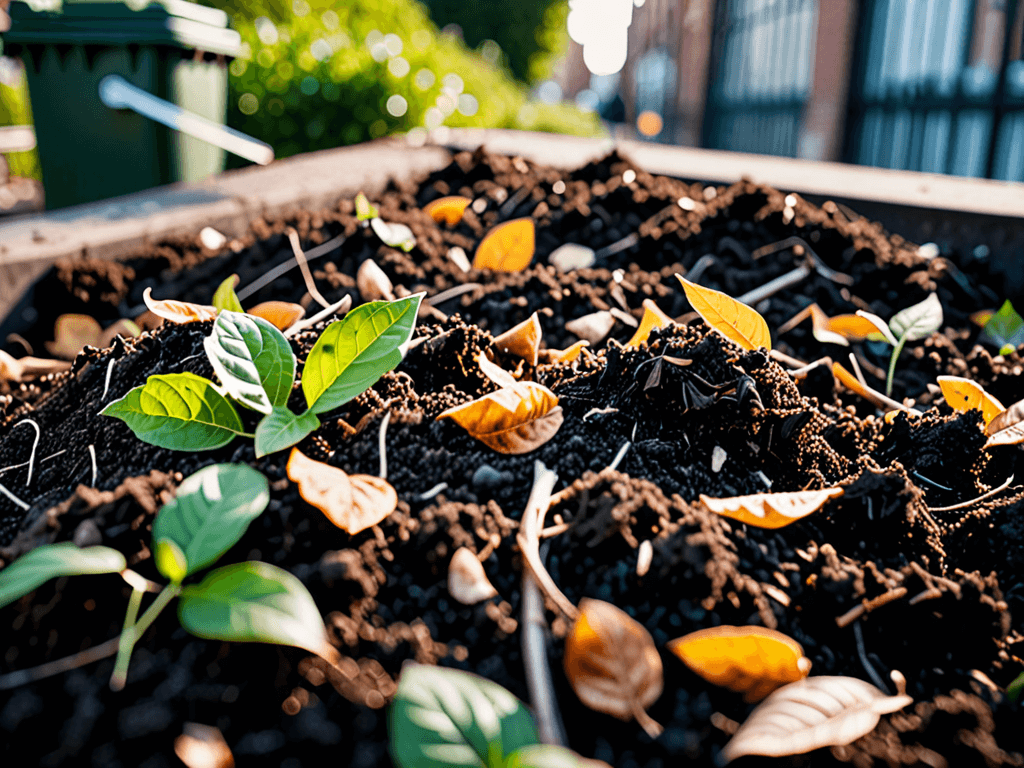Urban composting is a sustainable solution that transforms waste into a valuable resource. As cities grow, finding efficient ways to manage waste is crucial. Urban composting not only reduces landfill reliance but also enriches soil for gardeners. This guide will walk you through the essentials of starting, maintaining, and maximizing the benefits of urban composting, including choosing the right tools and avoiding common pitfalls.
Understanding the benefits of urban composting
Urban composting offers numerous benefits for both the environment and urban dwellers. By reducing the amount of waste sent to landfills, urban composting significantly decreases greenhouse gas emissions, which are harmful to our planet.
It transforms organic waste into rich compost, which can be used to enhance soil quality in urban gardens, parks, and community spaces. This enriched soil leads to healthier plant growth, promoting biodiversity and improving air quality.
Moreover, urban composting helps foster community awareness of sustainability practices and encourages responsible waste management. By participating in urban composting, residents can contribute to a more sustainable city and take an active role in environmental conservation.
Choosing the right composting tools and materials
Choosing the right composting tools and materials is crucial for effective urban composting. Begin with a sturdy compost bin. Look for one with good airflow and a secure lid to ensure your compost doesn’t attract pests.
Many urban composters prefer vermicomposting bins, which use worms to speed up the composting process. As for materials, gather a mix of ‘greens’, such as fruit and vegetable scraps, and ‘browns’, like dried leaves and cardboard. This balance is important to maintain a healthy decomposition process.
Avoid adding dairy, oils, or meat, as they can create odors and attract pests. Also, consider investing in a compost thermometer to monitor the temperature within your compost pile and ensure it’s decomposing efficiently.
By selecting the right tools and materials, you’ll set the foundation for successful urban composting.
Steps to start your urban composting system
To start your urban composting system, find a suitable location for your compost bin, ideally in a dry, shady spot.
Select a bin that fits your space and volume needs.
Once your bin is ready, begin by adding a layer of ‘brown’ materials like twigs or straw to help with aeration.
Then, alternate layers of ‘green’ materials, such as vegetable scraps, with more ‘browns’ to maintain balance.
Regularly turn your compost with a pitchfork to speed up decomposition and prevent odors.
Monitor moisture levels; your compost should be as damp as a wrung-out sponge.
Finally, be patient—composting can take several months before you see results, but the outcome is rewarding for your garden and the environment.
Maintaining your compost pile for optimal results
To maintain your compost pile for optimal results, ensure you regularly turn it to provide the necessary oxygen for microorganisms to thrive. This process helps accelerate decomposition and prevents unpleasant odors.
Keep the pile moist, similar to a damp sponge, but avoid overwatering as this can lead to sogginess and hinder airflow. Pay attention to the balance of ‘greens’ and ‘browns’; insufficient carbon-rich browns can cause the pile to become too wet or smelly.
Temperature monitoring is key—active composting can be recognized by a warm core, indicating efficient decomposition. Be mindful of adding new materials and avoid including meat or dairy products as they may attract pests and disrupt the ecosystem.
Regular monitoring and adjusting are essential to producing rich, healthy compost for your garden.
Common pitfalls to avoid in urban composting
Avoiding common pitfalls in urban composting can make the process more efficient and rewarding.
One major mistake is overloading your compost bin with one type of material, like too many ‘greens’ without enough ‘browns’, leading to a smelly pile. Balance is essential to maintaining proper aeration and decomposition.
Another pitfall is neglecting to turn the compost regularly, which can result in a lack of necessary oxygen, causing the pile to become compact and slow down breaking down waste.
Moisture levels can also pose a challenge; compost that’s too wet can become anaerobic, while a too-dry pile slows decomposition.
Finally, avoid adding items like meat, dairy, or oils, which can attract pests and create unpleasant odors.
By being mindful of these issues, your urban composting project can thrive successfully.
Conclusion: Embracing Urban Composting
Urban composting is more than just a waste management solution; it’s a significant step toward sustainable living in cities.
By understanding the benefits of urban composting and using the right tools, anyone can turn organic waste into valuable compost.
Avoid common pitfalls, and with patience, you’ll transform your waste into nutrient-rich soil that benefits both your garden and the environment.
Commit to maintaining your compost correctly, and you’ll experience firsthand the positive impact it can have on urban ecosystems.
Every effort counts, and by embracing urban composting, you contribute to a healthier, greener future for urban areas.
FAQ – Urban Composting Frequently Asked Questions
What are the main benefits of urban composting?
Urban composting reduces landfill waste, lowers greenhouse gas emissions, and creates nutrient-rich compost for gardens.
What materials can be added to a compost bin?
You should add fruit and vegetable scraps, coffee grounds, eggshells, and yard waste like leaves and grass clippings.
What should I avoid adding to my compost pile?
Avoid adding meat, dairy, fats, and oils, as these can attract pests and slow down the composting process.
How often should I turn my compost pile?
Turn your compost pile every few weeks to provide oxygen, which helps speed up the decomposition process.
How long does it take for compost to be ready to use?
Compost can take anywhere from two months to two years to become mature, depending on conditions.
What is the right ratio of ‘greens’ to ‘browns’ in composting?
A balanced mix is 1 part ‘greens’ (nitrogen-rich) to 2-3 parts ‘browns’ (carbon-rich materials).
Can composting be done indoors?
Yes, with a small composting bin and the right balance of materials, indoor composting is possible.


